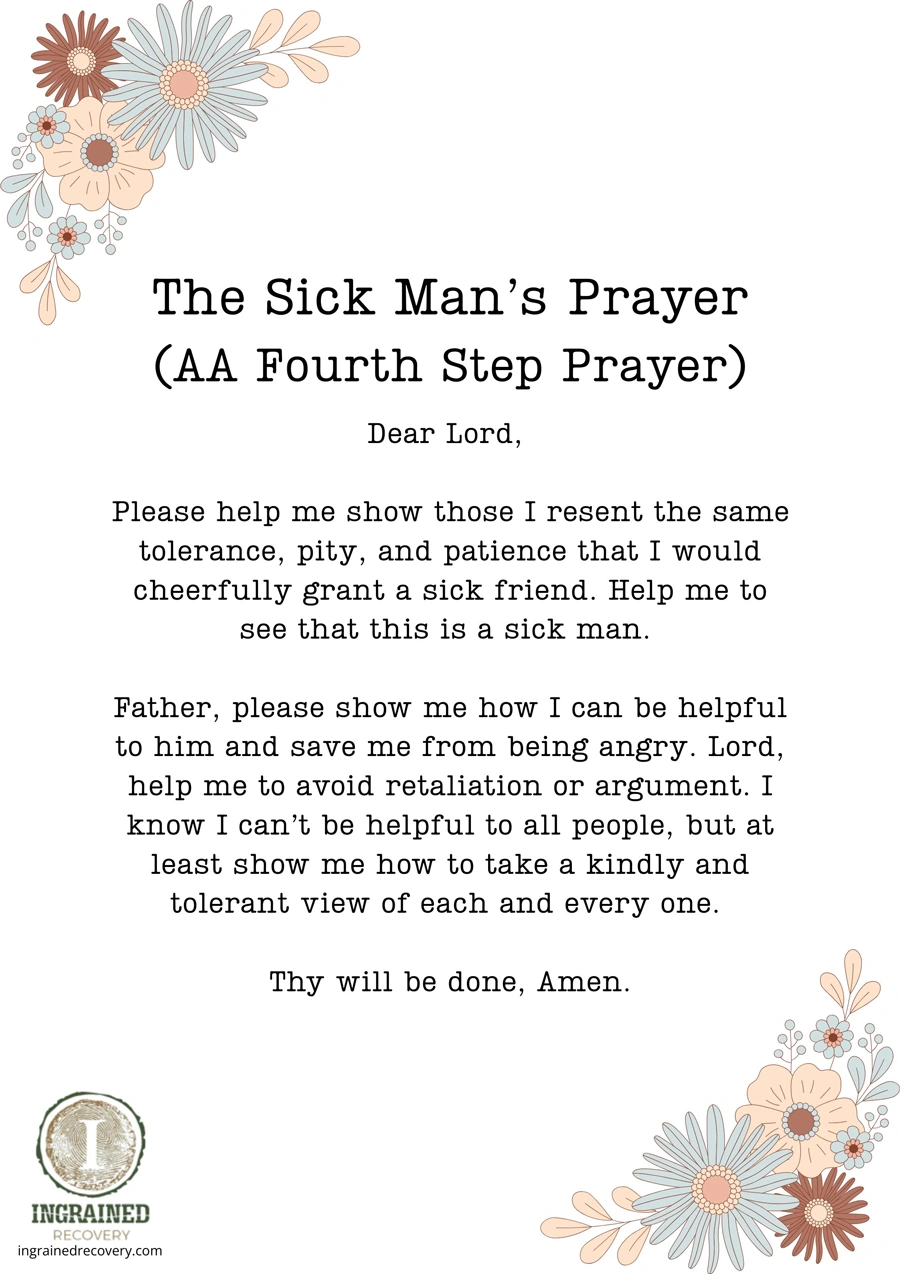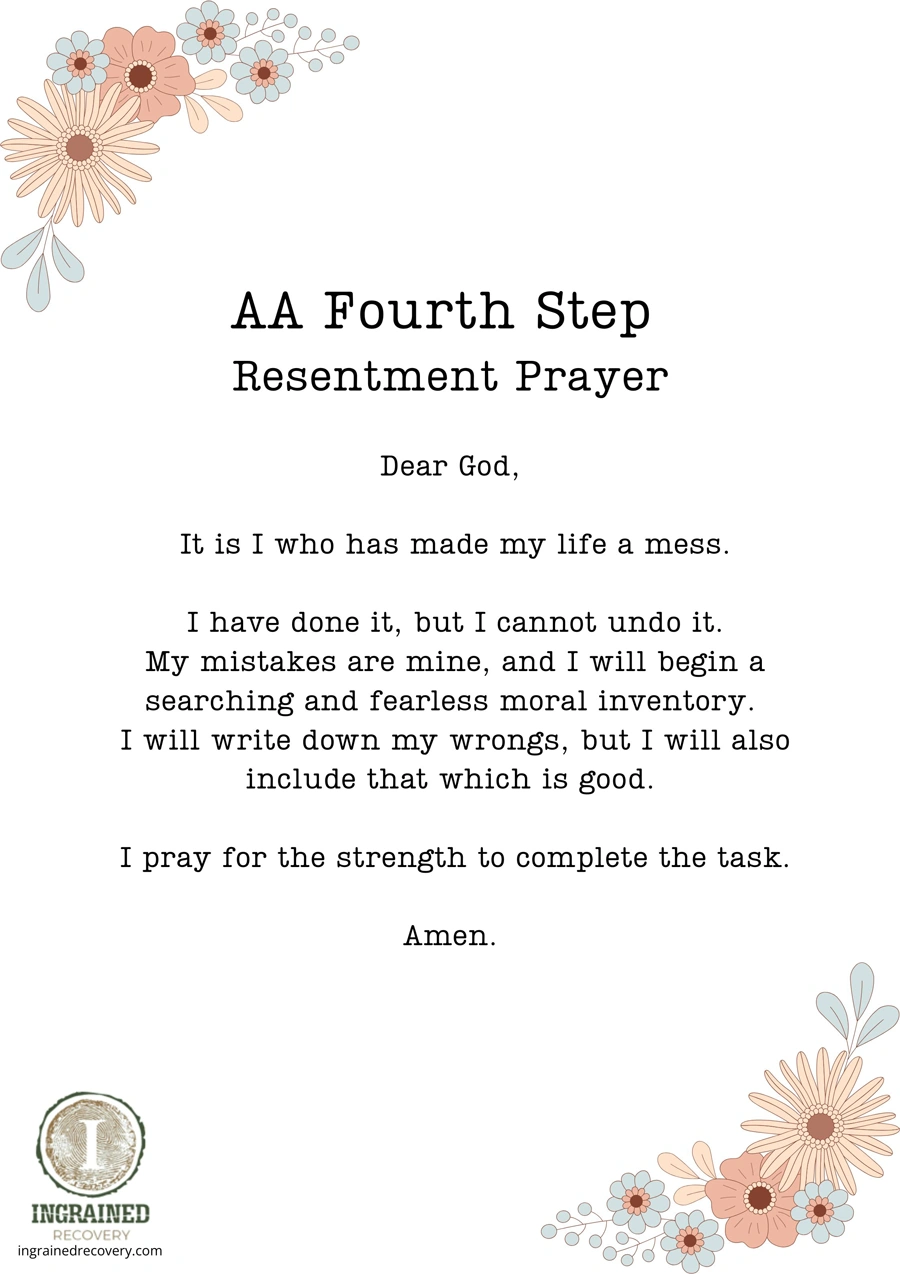A Guide and Downloadable Resource on the Resentment Prayer
Some new members express surprise when they learn that Alcoholics Anonymous includes the AA Resentment Prayer in the fourth step. But the Alcoholics Anonymous (AA) program has included prayer since the organization’s inception.
Program founders asked members to pray to connect with a Higher Power, considering prayer a practical tool to release anger and fear. The AA Big Book suggests prayer is a way to quiet the mind, let go of resentment, and find patience and strength.
The inpatient and outpatient treatment programs at Ingrained Recovery provide helpful tools and life skills that help our graduates stay sober.
One tool, the client’s personalized aftercare plan, almost always includes participating in a weekly support group meeting. We recognize that ongoing support enables clients to maintain their focus on sobriety.
This post will help you gain insight into the 4th step resentment prayer in two versions – the official AA prayer and the fellowship version often heard at meetings.
Get Accredited Treatment at Ingrained
Find Help At Ingrained Recovery
A Brief Introduction to Prayer in the Big Book
The Big Book of Alcoholics repeatedly recommends members turn to prayer as a tool for reflection and growth. In the early chapters of the book, founder Bill W. wrote about seeking spiritual help in moments of weakness. Later in the book, Step 11 calls explicitly for a call to lead a more spiritual life.
The best-known prayer in AA is the Serenity Prayer. But praying is important at every step during the journey to become free of substances.
When resentment or fear threatens long-term sobriety, praying is like hitting a pause button. It’s an excellent way to step back, recollect thoughts and emotions, and consider healthier actions to avoid retaliation or argument that can trigger substance use.
This foundation is what makes prayer important while completing the Fourth Step of AA, which can be a gut-wrenching process.
The Official Resentment Prayer on Page 67 of the AA Big Book

On page 67 of the Alcoholics Anonymous Big Book, Bill W. wrote:
“This is a sick man. How can I be helpful to him? God save me from being angry; thy will be done.”
These simple words of prayer are powerful. Bill admits that people who struggle with alcohol use disorders (AUD) have an illness; Bill also suggests they’re also perhaps spiritually sick.
Later, AA groups lengthened the prayer into the following:
“Please help me show those I resent the same tolerance, pity, and patience that I would cheerfully grant a sick friend. Help me to see that this is a sick man. Father, please show me how I can be helpful to him and save me from being angry. Lord, help me to avoid retaliation or argument. I know I can’t be helpful to all people, but at least show me how to take a kindly and tolerant view of each and every one. Thy will be done.”
Feel free to print off our PDF of this prayer and carry it with you. The following sections will break down some key phrases of this prayer to give you a closer look at their significance.
Why Resentment Is Called the “Number One Offender”
Bill and co-founder Dr. Bob understood that when we resent something, it becomes a toxin trapped inside the body. It leads to emotional and psychological pain and destroys self-love and inner peace.
In the 4th step prayer, the person asks for the same tolerance for those they resent as they would cheerfully grant a sick person. That person they resent could also be themselves.
The prayer encourages the self-seeking of self-pity, which we would call self-compassion today. They connected the recovery process with negative feelings like anger, resentment, and hate before it became mainstream thinking.
Self-compassion is necessary in Step Four, as it makes you focus on things you’d rather not remember. However, completing it is necessary later in AA, when you make amends with anyone you’ve wronged.
Significance of the Line “This Is a Sick Man”
Bill W. was likely one of the earliest people to acknowledge publicly that alcohol use is a sickness. Until that time, most physicians would have considered it a lifestyle choice or a lack of willpower. By calling those struggling sick people, Bill shifted thinking.
He helped open minds to consider that alcoholism wasn’t wrongdoing but an illness. People struggling suddenly had permission to shift negative feelings about themselves to more compassionate feelings.
Alcoholism as an illness was a more tolerant and inclusive view than most of the Western world had ever even thought of at the time.
Understanding the Image of the “Sick Friend”
Many self-help and behavioral health programs ask participants to show themselves the same kind and tolerant view they would show an under-the-weather friend. In this prayer, it asks to grant oneself the same tolerance, pity, and patience one might cheerfully grant a sick friend.
You would never accuse a dear friend of getting sick on purpose; thus, speaking these kind words to yourself can help you accept alcohol abuse and alcoholism itself as a disease.
This phrase points to letting go of past negative emotions to make space for forgiveness, self-tolerance, and peace in your life.
The ‘Set Aside prayer‘ is another unofficial AA prayer that can be helpful when letting go of resentments and even expectations that have become counterproductive in daily life.
The Unofficial Step 4 Fellowship Prayer You May Hear at Meetings

A second prayer that emerged in AA is the unofficial Fourth Step prayer. It is common to hear this alternative inside some AA fellowships.
Some people call it “The Dear God, I Have Made My Life a Mess” prayer, or the “Resentment Prayer,” author unknown:
Dear God,
It is I who has made my life a mess.
I have done it, but I cannot undo it.
My mistakes are mine & I will begin a searching & fearless moral inventory.
I will write down my wrongs, but I will also include that which is good.
I pray for the strength to complete the task.
Nobody seems certain why a second prayer came to be, but some believe it reflects gender-neutral, more compassionate language than the original prayer from the 1930s.
The Role of Prayer in Step Four of Alcoholics Anonymous
AA Step Four requires members to conduct a “searching and fearless moral inventory” of themselves. They must be brutally honest and admit their shortcomings.
This helps them realize the connection between addiction and their emotions. This realization helps swap fear, resentment, and anger for more grateful feelings that lead to happiness and long-term sobriety.
Why Alcoholics Anonymous Members Use Both Versions
The AA program requires prayer to become spiritually whole and connect with the Lord or a Higher Power. However, the program has a tolerant view, allowing members to pray in whatever way holds the most truth for them. The prayers in the Big Book are suggestions, not requirements.
What Does AA World Services Says About Prayer and Variations?
Alcoholics Anonymous World Services (AAWS) only publishes conference-approved literature. These puclications include the Big Book, the Twelve Steps, and the Twelve Traditions.
You won’t find the long versions of either of the prayers we mention in any of their publications, just Bill W.’s short single-sentence prayer on page 67.
Prayer Can Integrate with Therapies for Healing Alcohol Use Disorder

For those who believe in a Heavenly Father or Higher Power, prayer can integrate with evidence-based therapies. While it’s not necessary to pray to a particular God to receive the benefits of therapy, many clients do believe it helps, especially during the first two weeks of rehab, when medical detox is the hardest.
Compassion Practices: Treating Yourself as a Sick Friend
Holistic wellness means treating all aspects of a person’s mental illness. Alternative treatments like loving-kindness meditation help clients have a kind and tolerant view of themselves, providing forgiveness for past mistakes.
It makes them realize that being honest and self-accepting helps to overcome negative emotions that can trigger substance use.
Resentment, Forgiveness, and Emotional Regulation and CBT
Cognitive behavioral therapy is one of the most common therapies for treating AUD. It helps the person identify negative feelings and reframe them as positive. When someone in therapy prays to become free of anger, they are actually practicing what CBT would call cognitive restructuring.
CBT gives the person a strong framework for getting rid of past hurts. Supplementing it with prayer helps them look forward to new blessings, like wisdom and prosperity in sobriety.
Up To 100% of Rehab Covered By Insurance
Find Help At Ingrained Recovery
How Does Prayer Support Mental Health Recovery?
Many in recovery see God as a partner in recovery and the path to a new life – and there might be something to that.
Prayer has science-backed, measurable benefits toward stress reduction, mood, and focus. Prayer can strengthen resilience and make it easier to avoid triggers that lead to relapses.
Using Prayer as Part of a Structured Routine
People in recovery need a structured routine and accountability. Some use prayer as part of a morning routine; trusting the power of God puts them in a positive mindset for the rest of the day.
Others pray in the evening to gain a sense of peace as part of their bedtime routine, ensuring they get the sleep they need to stay well.
Call Ingrained Recovery for Proven Sobriety Support Options
Don’t let past mistakes in life or harmful emotions like anger, fear, hurt, or resentment hold you back from getting clean and sober. You have the power to be free of the influence of substances; we have the tools that empower you to do so. Call Ingrained Recovery today to learn how you can get the help you need; your call to our admissions team is always confidential, so please don’t hesitate to reach out now!

